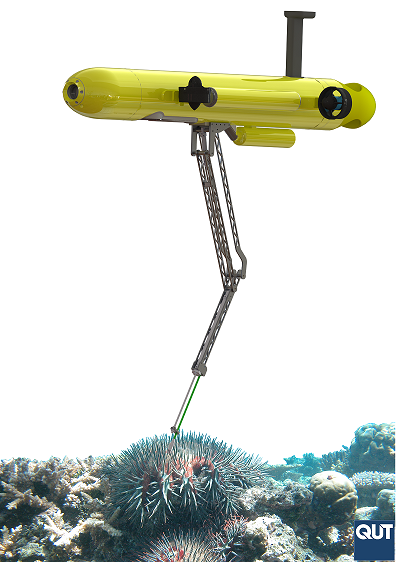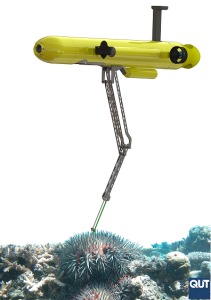
The Great Barrier Reef Foundation has joined forces with QUT roboticists Drs Matthew Dunbabin and Feras Dayoub to enter the COTSbot into Google’s Impact Challenge, which helps not-for-profit organisations develop technologies that can help address the world’s biggest social challenges.

Image credit: wiki.qut.edu.au
The COTSbot is an autonomous underwater vehicle that was designed to increase the efficiency of Crown-Of-Thorns Starfish (COTS) eradication. The primary task of the COTSbot is to autonomously navigate within complex reef environments and automatically detect COTS on the coral and administer an injection.
The Foundation – which has been named as one of 10 finalists and is now in the running for one of four $750,000 grants – said a positive outcome of the challenge will see the team focus its efforts on transforming the COTSbot into RangerBot, a low-cost, vision enabled autonomous underwater vehicle for monitoring a wide range of issues facing coral reefs.
“This project is about giving those looking after our coral reefs the tools they need to protect these precious resources,” the Foundation’s Managing Director, Anna Marsden, said.
“More than a billion people depend on reefs for their food and livelihood – they stand to lose the most if those important ecosystems are destroyed. We want to put the cost-effective, flexible RangerBot into the hands of the people at the front line of looking after and managing coral reefs, as extra ‘hands and eyes’ to manage those critical environments.”
The 10 finalists will present their projects to a panel of judges on Wednesday October 26. They will be assessed on their impact, technology and innovation, scalability and feasibility.
“Environmental robotics is a real passion of ours and we see so much potential for these advanced technologies to transform the way we protect our world’s precious reefs,” said Dr Dunbabin, from QUT’s Institute for Future Environments and Science and Engineering Faculty.
“A $750,000 prize would allow us to expand our current platform’s functionality into a truly multipurpose, multifunction tool for monitoring a wide range of issues facing coral reefs – coral bleaching, water quality, pest species, pollution and siltation included. It will stay under the water almost three times longer than a human diver, gather vastly more data, and operate in all conditions and all times of the day or night.”
According to him, the RangerBot could also assist in mapping expansive underwater areas using innovative vision-based technologies.
“This represents a quantum technology leap in both marine robotics and reef protection – the only autonomous, affordable, multifunction solution for effectively detecting and addressing threats to coral reefs, making RangerBot widely available and accessible to reef communities worldwide,” he added.
“I guess you could call RangerBot the Swiss Army Knife of marine robotics.”
Ms Marsden said the RangerBot could play a key role in maintaining the health of the Great Barrier Reef, which has lost half its coral cover over the past 30 years.
“Even though the Great Barrier Reef is internationally acknowledged as the best managed reef globally, due to its size and complexity, effective management is a mammoth and expensive task,” she said.
“RangerBot has the potential to revolutionise the way we manage our oceans and may be a missing piece in the puzzle to save our precious reefs.”


















